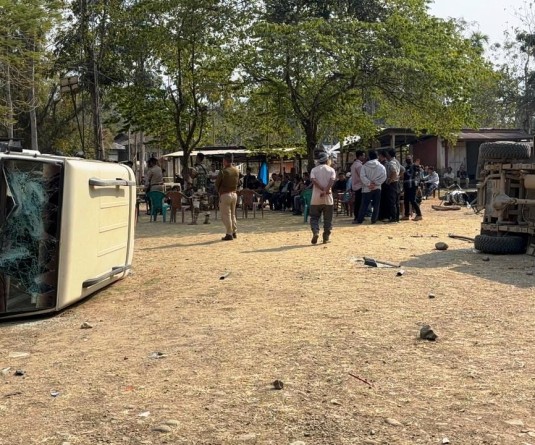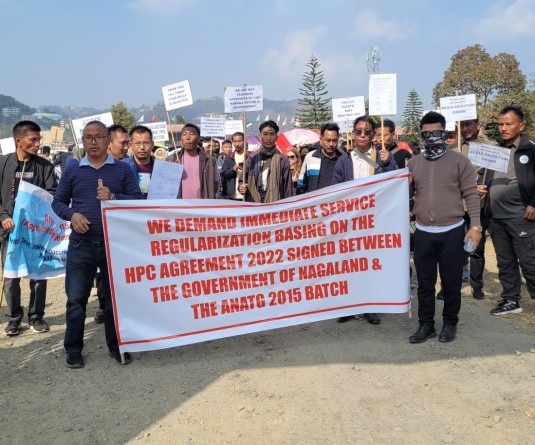
Kohima, November 18 (MExN): A ‘Live National Webinar’ was conducted by Model Christian College (MCC), Kohima on a topic “Creating Human Rights Culture and the Role of Society Therein in the 21st Century” on November 17.
Advocate Kezhokhoto Savi, President Nagaland Voluntary Consumers’ Organisation (NVCO) who is also the President of Rotary Club Kohima Rotary International, was the resource person of the webinar organised by the Department of Sociology, MCC.
In his presentation, Savi stressed that creating ‘Human Rights Culture’ is the need of the hour.
The society and culture are interrelated and cultures are the products of human societies, he added.
“Culture is the breeding ground of civilization and civilization serves as the vehicle and environment of culture,” the Advocate inforemd.
He further informed that adoption of the world plan of action on education for Human Rights and Democracy by UNESCO Montreal Congress 1993, underlined its ultimate purpose is to create a “Culture of Human Rights”.
Universal Culture of Human Rights’ can be constructed only through imparting of knowledge, skill and moulding of attitude, he stressed.
Savi further noted that the role of education as a foundation for a Human Rights Culture was recognized by 44th Session of the International Conference on Education, Geneva 1994.
This conference has accepted that education should promote knowledge, values, attitudes and skills conducive to respect for Human Rights to an active commitment to the defense of such rights, he said. “Education shall be directed to the full development of human personality and to the strengthening of respect for human rights and fundamental freedoms.”
Savi further asserted that to create Human Rights Culture, one must be willing and ready to defend and follow the Human Rights Standards in everyday life and also creation of peaceful non-violent behavioural patterns.
The role of National human Rights Commission and the State Human Rights Commission can play major role in developing human rights culture in all the states in the country, he said.
Human Rights scenario in Nagaland
To highlight the human rights scenario of Nagaland, one must asked whether the people of the State are literate enough on Human Rights.
Are they able to stand for their own rights and give due respect to the rights of others? Savi posed rhetorically.
“The answer is ‘NO’ and we need to programme a vigorous defense and promotion of human rights,” he asserted.
To this end, the NVCO President said that the churches, educational institutions and colleges have to play active roles in promoting peace, justice and social transformation.
He further cited the several atrocities including recovery of nine bodies Nagaland Police at Pachaspura near Chümoukedima on January 3, 2014; alleged attempt to murder and subsequent death of a young boy on December 28, 2013; assault of the passengers of a Zunheboto-bound taxi on December 21, 2013;
the atrocities meted to the Rengma Nagas of Karbi Anglong from December 25, 2013; the March 5, 2015 incident; killing of three persons were killed by unidentified assailants on March 22, 2021 and so on.
Despite of high of human rights violations in Nagaland, the State is yet to set up ‘State Human Rights Commission,’ Savi said.
Besides the rest of the country, North East India is an example Human Rights violations, he said.
One of the main problems faced by the citizens of this region is the existence of several armed groups and the Central Government imposing the Armed Forces (Special Power) Act, 1958, amended in 1972, he pointed out.
A major theme of the human rights discourse is the Armed Forces (Special Power) Act of 1958 widely seen in the North-East as ‘draconian,’ he said.
Meanwhile, the Advocate said that rights and duties are primary concerns of the human civilization and closely connected with liberty, growth, development, dignity, responsibility and welfare of the general community.
However, knowledge about human rights is not popular among the citizens of the North-East India, he noted.
As a result, violation of human rights is so common that the purpose of the Universal Declaration of Human Rights is defeated considerable number of times, he added.
But while the techno-hyped societies are progressing fast, the Human Rights is not, even among the among the literate and educated ones, Savi argued,
To this end, he said that in 21st century, the society have a vital role to play in the promotion and protection of human rights so to provide to the men, women and children of this planet an equal degree of human rights and freedoms.
The society should be aimed a much higher level of awareness and preparedness in the defense, introducing new systems of much refined and safer procedure, thus creating a new and unprecedented degree of human rights security, he pointed out.
Human rights standards, although rooted in many culture are universal, though their universality human rights must afford protection to all humanity, including special groups such as women, children, minorities and indigenous peoples, workers, national minorities, refugees and displaced persons, the disabled and the elderly, he added.
“There must be a holistic and integrated approach to human rights.”
Meanwhile, the NVCO President also stressed that children’s rights too human rights.
The National Human Rights Commission, New Delhi asked every state to set up State Human Rights Commission and had also recommended to incorporate human rights education in state education board syllabus and further urged the NGOs to create more awareness, he said.
Savi further said that Human rights is a symbol of hope and the need of the hour as thier violations become a day to day event in the society.
“Creating a safe, secured and harmonious environment for the neo-literate is the look of the family, the community, the civilized society and community at large,” he said.
He also note that Right to food is universal human rights, which is acknowledged at the regional, national and international levels, he said.
Thus, it is very important for all the state to effectively implement the National Food Security Act, 2013 without any involvement of wrong diversion and corruption, he added.
Earlier Kevilenuo Zao HOD of MCC department of Sociology gave the welcome note while it was moderated by Asst. Professor Neichiizonuo Rūpreo. It concluded with vote of thanks by Asst. Professor Kekhrieneinuo.





